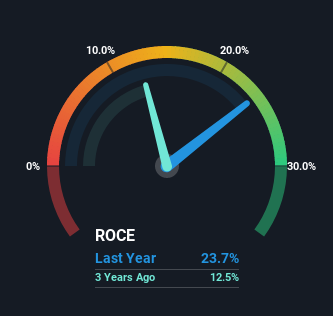
If you're looking for a multi-bagger, there's a few things to keep an eye out for. Firstly, we'll want to see a proven return on capital employed (ROCE) that is increasing, and secondly, an expanding base of capital employed. If you see this, it typically means it's a company with a great business model and plenty of profitable reinvestment opportunities. And in light of that, the trends we're seeing at Denbury's (NYSE:DEN) look very promising so lets take a look.
What Is Return On Capital Employed (ROCE)?
For those who don't know, ROCE is a measure of a company's yearly pre-tax profit (its return), relative to the capital employed in the business. To calculate this metric for Denbury, this is the formula:
Return on Capital Employed = Earnings Before Interest and Tax (EBIT) ÷ (Total Assets - Current Liabilities)
0.24 = US$378m ÷ (US$2.1b - US$539m) (Based on the trailing twelve months to June 2022).
Thus, Denbury has an ROCE of 24%. That's a fantastic return and not only that, it outpaces the average of 16% earned by companies in a similar industry.
View our latest analysis for Denbury

Above you can see how the current ROCE for Denbury compares to its prior returns on capital, but there's only so much you can tell from the past. If you'd like, you can check out the forecasts from the analysts covering Denbury here for free.
The Trend Of ROCE
Denbury has not disappointed in regards to ROCE growth. The figures show that over the last five years, returns on capital have grown by 450%. That's a very favorable trend because this means that the company is earning more per dollar of capital that's being employed. In regards to capital employed, Denbury appears to been achieving more with less, since the business is using 61% less capital to run its operation. Denbury may be selling some assets so it's worth investigating if the business has plans for future investments to increase returns further still.
On a side note, we noticed that the improvement in ROCE appears to be partly fueled by an increase in current liabilities. Effectively this means that suppliers or short-term creditors are now funding 25% of the business, which is more than it was five years ago. It's worth keeping an eye on this because as the percentage of current liabilities to total assets increases, some aspects of risk also increase.
In Conclusion...
In the end, Denbury has proven it's capital allocation skills are good with those higher returns from less amount of capital. Since the stock has returned a solid 19% to shareholders over the last year, it's fair to say investors are beginning to recognize these changes. With that being said, we still think the promising fundamentals mean the company deserves some further due diligence.
On a separate note, we've found 1 warning sign for Denbury you'll probably want to know about.
Denbury is not the only stock earning high returns. If you'd like to see more, check out our free list of companies earning high returns on equity with solid fundamentals.
If you're looking to trade Denbury, open an account with the lowest-cost platform trusted by professionals, Interactive Brokers.
With clients in over 200 countries and territories, and access to 160 markets, IBKR lets you trade stocks, options, futures, forex, bonds and funds from a single integrated account.
Enjoy no hidden fees, no account minimums, and FX conversion rates as low as 0.03%, far better than what most brokers offer.
Sponsored ContentNew: Manage All Your Stock Portfolios in One Place
We've created the ultimate portfolio companion for stock investors, and it's free.
• Connect an unlimited number of Portfolios and see your total in one currency
• Be alerted to new Warning Signs or Risks via email or mobile
• Track the Fair Value of your stocks
Have feedback on this article? Concerned about the content? Get in touch with us directly. Alternatively, email editorial-team (at) simplywallst.com.
This article by Simply Wall St is general in nature. We provide commentary based on historical data and analyst forecasts only using an unbiased methodology and our articles are not intended to be financial advice. It does not constitute a recommendation to buy or sell any stock, and does not take account of your objectives, or your financial situation. We aim to bring you long-term focused analysis driven by fundamental data. Note that our analysis may not factor in the latest price-sensitive company announcements or qualitative material. Simply Wall St has no position in any stocks mentioned.
About NYSE:DEN
Denbury
Denbury Inc. operates as an independent energy company in the Gulf Coast and Rocky Mountain regions.
Solid track record with adequate balance sheet.
Similar Companies
Market Insights
Community Narratives



